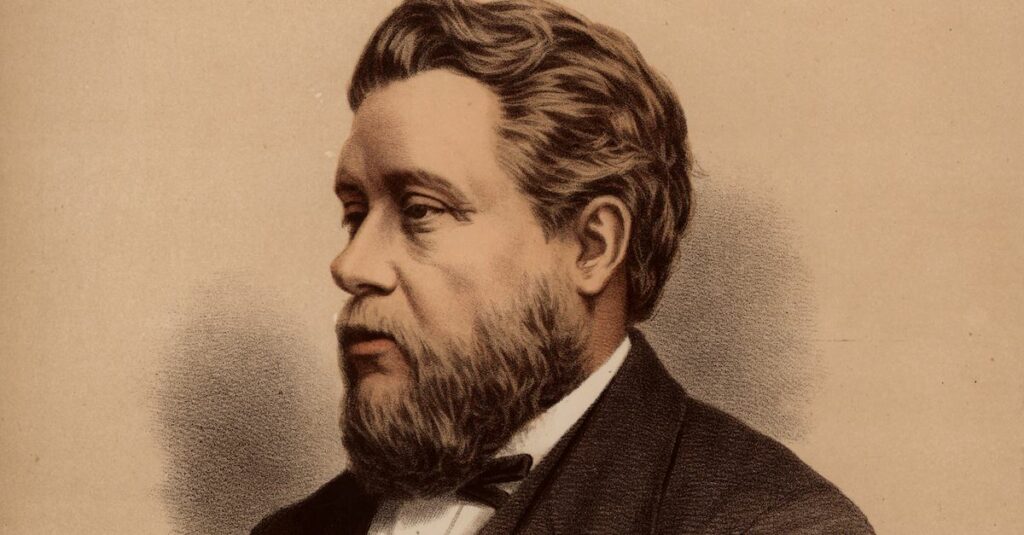By the time he was 19 years old, Charles Spurgeon was a published author and pastoring a church of hundreds of people. His sermons sold thousands of copies each week. Over the course of the next 38 years, this man preached up to a dozen times each week to tens of thousands of people. He founded a seminary, published a monthly magazine, began two orphanages, and wrote over 150 books, though he never earned a university degree.
Charles Haddon Spurgeon was born in Kelvedon, Essex (southeast England) in 1834, the oldest of 17 children. Spurgeon’s father and grandfather were both ministers in non-conformist churches, meaning they were not members of the Church of England, but it was from his mother that a young Spurgeon received his spiritual vitality. This she imprinted upon him through regular Bible reading and prayer with his siblings.
Despite this Christian upbringing, Spurgeon did not have a personal experience with Jesus. This happened dramatically when the 15-year-old Spurgeon was admonished directly by the pastor to embrace Jesus as his Savior.
He would later write about his conversion: “There and then the cloud was gone, the darkness had rolled away, and that moment I saw the sun; and I could have risen that instant, and sung with the most enthusiastic of them, of the precious blood of Christ, and the simple faith which which looks alone to Him .”[1] Spurgeon was baptized a month later.
From Country Church to Big City
That same year, Spurgeon preached his first sermon in the little village of Teversham, outside Cambridge. His giftedness was instantly apparent, and what began as a guest appearance ended in Spurgeon being appointed pastor of a small Baptist church in Waterbeach, also outside Cambridge. He pastored that church for three years until he received a call, at age 19, to pastor New Park Street Chapel in London.
Once the largest Baptist church in London, New Park Street had dwindled in attendance before Spurgeon arrived. His fame was almost immediate. Known for his quick wit and booming voice, Spurgeon quickly attracted newcomers to his church. Within a year his sermons were being published and circulated weekly, which only added to his popularity. By the time he was 22, Spurgeon was the most popular preacher of his day.
During his first years at New Park Street, Spurgeon met his wife Susannah and they were married in January 1856. By September of the same year they had twin boys born to them, Charles and Thomas. Thomas later became the pastor of his father’s church a year after Spurgeon died.
Spurgeon’s fame did not come without difficulty. Consistently chastised by elders for his youth, and regularly attacked by the press, Spurgeon’s direct, eloquent, but long sermons drew men and women from all corners of England. He became a must-see for anyone visiting London.

Prince of Preachers
Known as the Prince of Preachers, Spurgeon set a preaching pace few could match. By the time he was 20, he had preached over 600 sermons. Some estimate he preached to ten million people over the course of his ministry through over 3600 sermons. Most of his messages are still available online today.
Spurgeon quickly outgrew the seating capacity for New Park Street. After two expansions of the Chapel, which still weren’t enough, a move to a different location with a new church name (Metropolitan Tabernacle) and a 5000-seat auditorium was necessary.
Spurgeon pastored Metropolitan Tabernacle up to the year before his death in 1892. He oversaw an incredible expansion of the church, from about 200 members to over 5,000. During that time, over 14,000 people were baptized at Metropolitan Tabernacle and his weekly sermons were published with a circulation of 25,000. Spurgeon sold over fifty-six million copies of his sermons in nearly forty languages in his own lifetime.
Spurgeon’s sermons were consistently marked with a theological apologetic and evangelistic zeal. Contrary to the Anglican Church, which at this time had grown soft on the gospel, Spurgeon hammered away at the “three Rs” of the faith: ruin, redemption, and regeneration. He always assumed there were people present who needed to embrace Jesus as Lord and Savior. His desire was to expose their ruin from sin, their need for Christ’s redemptive sacrifice on the cross on their behalf, and their hope of regeneration through God’s sovereign Spirit.
Spurgeon summed up this desire well when he wrote, “My entire theology can be condensed into four words: Jesus died for me.”[2]
A Love of God’s Word
Despite his lack of formal education, Spurgeon was by no means uneducated. By the time of his death, his personal library exceeded 12,000 volumes. He was particularly fond of Puritan writers.
Spurgeon became a prolific author, writing scores of books including Bible commentaries, devotionals, and even anecdotes and popular sayings. Perhaps his most popular is the 6-volume commentary on the Psalms, The Treasury of David, published in 1885.
But his true love was God’s Word. To him it was “a bulwark and a high tower, a castle of defense against the foe.” He believed the Christian’s life must be saturated with the Bible. “Oh, see to it that the Word of God is in you, in your very soul, permeating your thoughts, and so operating upon your outward life, that all may know you to be a true Bible-Christian, for they perceive it in your words and deeds.”[3]
He also used the King James Version regularly, but not exclusively. Toward the end of his ministry, the English Revised Version was published. In some places, this translation differed from the King James Version, and Spurgeon was not shy to point out his preference for the newer version in a few places.[4] [5] He wasn’t afraid of textual criticism as long as it produced a more accurate Scripture. But for the entirety of his ministry, the King James Version dominated his sermons.
Dozens of Ministries Founded
With his popularity came incredible wealth. However, Spurgeon used his money with great influence for God’s kingdom. By some counts, Spurgeon began over 60 different ministries, including an orphanage for boys and later another for girls, a publishing ministry, nursing homes, a ministry for the blind, and dozens more. Whatever salary he had received from Metropolitan Tabernacle had been paid back in full through his donations to the building projects. He was also a vocal opponent of the global slave trade and the Chinese drug trafficking that had become a major problem in England.
In 1865, Spurgeon began publishing the monthly pastoral ministry magazine, The Sword and the Trowel. It became an invaluable resource for likeminded pastors and churches around the world. Spurgeon served as the editor of the magazine throughout his ministry. A digital library of the first five years of the magazine can be found here.
Adjusted for inflation, Spurgeon’s income over his lifetime was millions of pounds in today’s currency. Yet, when he died he left only two thousand pounds (1892 value) to his wife.[6] He spent all of his money founding and supporting new ministries.
The “Downgrade” Controversy
Spurgeon’s life was not without controversy. Partly to blame with his often flamboyant style of preaching, he wouldn’t shy away from “naming names” when necessary. Spurgeon was a harsh critic of Catholicism and its rituals, Anglicanism and its capitulation to modernism, and the general hypocrisy of Christians who had one foot firmly planted in the world. He once wrote, “My firm conviction is that we have had enough polite preachers.”[7]
Spurgeon was a Calvinistic Baptist, what some would label today as a Reformed Baptist. He believed that God in his grace elected the people he chose to save from humanity, while allowing the rest to go their own way. The core of Spurgeon’s theology is best seen in a controversy later in life that eventually resulted in his church leaving its denomination.
At the time, Metropolitan Tabernacle was a member of the Baptist Union. Over time, the Union began to weaken on some key theological issues that Spurgeon believed were crucial to a proper understanding of the gospel.
In 1887, Spurgeon publically stated that some of his fellow Baptist pastors had begun to “downgrade” Christian doctrine. The growth of critical biblical scholarship coupled with rising Darwinism had caused many Christians to rethink their position on key issues like miracles, the atoning sacrifice of Jesus, and the inspiration and infallibility of Scripture. Spurgeon published blistering critiques in his monthly magazine.
Spurgeon’s critique caused considerable division among Baptist churches. Eventually, he was censured by the Baptist Union and he resigned the following year from the denomination.
Suffering for Christ
The stress Spurgeon experienced over the course of his ministry eventually took its toll. Overweight and a regular smoker of cigars, Spurgeon suffered from various ailments the last 24 years of his life, including gout, kidney disease, and and rheumatism.[8]
On top of all this, he suffered from chronic depression.
Yet he pressed on, serving as the senior pastor of his church up to six months before his death. Spurgeon died quietly in 1892 recuperating from several illnesses in Menton, France, a favorite vacation spot for him. He was only 57. Tens of thousands of people attended his funeral in London when he was laid to rest at Metropolitan Tabernacle.
Lasting Legacy
Spurgeon’s influence continues to be felt today. His sermons remain popular, especially among pastors looking to catch the same homiletic fire and evangelistic fervor. His books are read by millions around the world. Spurgeon’s church and his pastor’s college still operate with his vision.
Charles Haddon Spurgeon is certainly counted among the great Christian ministers of the past two millennia. Yet, despite all his accomplishments, Spurgeon’s lasting legacy is his commitment to the gospel of Jesus Christ.
“I know of nothing which I would choose to have as the subject of my ambition for life than to be kept faithful to my God till death, still to be a soul winner, still to be a true herald of the cross, and testify the name of Jesus to the last hour. It is only such who in the ministry shall be saved .”
Those interested in further reading about Spurgeon can find a wealth of information at the Spurgeon Center for Biblical Preaching.
[1] Michael Reeves, “This Day in History: The Death of Charles Spurgeon,” Crossway, January 31, 2019, https://www.crossway.org/articles/this-day-in-history-the-death-of-charles-spurgeon/.
[2] Randy Alcorn, “Reflections on Christ’s Crucifixion,” Eternal Perspectives Ministries, March 31, 2021, https://www.epm.org/blog/2021/Mar/31/reflections-christs-crucifixion.
[3] Kevin Halloran, “100 of the Best Spurgeon Quotes,” Kevin Halloran, April 19, 2018, https://www.kevinhalloran.net/100-of-the-best-charles-spurgeon-quotes/.
[4] Elijah Hixson, “Was Spurgeon King James Only?” Spurgeon, January 18, 2018, https://www.spurgeon.org/resource-library/blog-entries/was-spurgeon-king-james-only/.
[5] Matthew R. Perry, “Spurgeon’s View of Bible Translations,” Dr Matt Perry, March 8, 2019, https://drmattperry.com/2019/03/08/spurgeons-view-of-bible-translations/.
[6] “Four Reasons Spurgeon Died Poor,” Spurgeon, October 11, 2016, https://www.spurgeon.org/resource-library/blog-entries/4-reasons-spurgeon-died-poor/.
[7] “Charles Spurgeon,” Christianity Today, n.d. https://www.christianitytoday.com/history/people/pastorsandpreachers/charles-spurgeon.html.
[8] Michael Reeves, “Did you Know that Charles Spurgeon Suffered from Depression?” Crossway, February 24, 2018, https://www.crossway.org/articles/did-you-know-that-charles-spurgeon-struggled-with-depression/.

